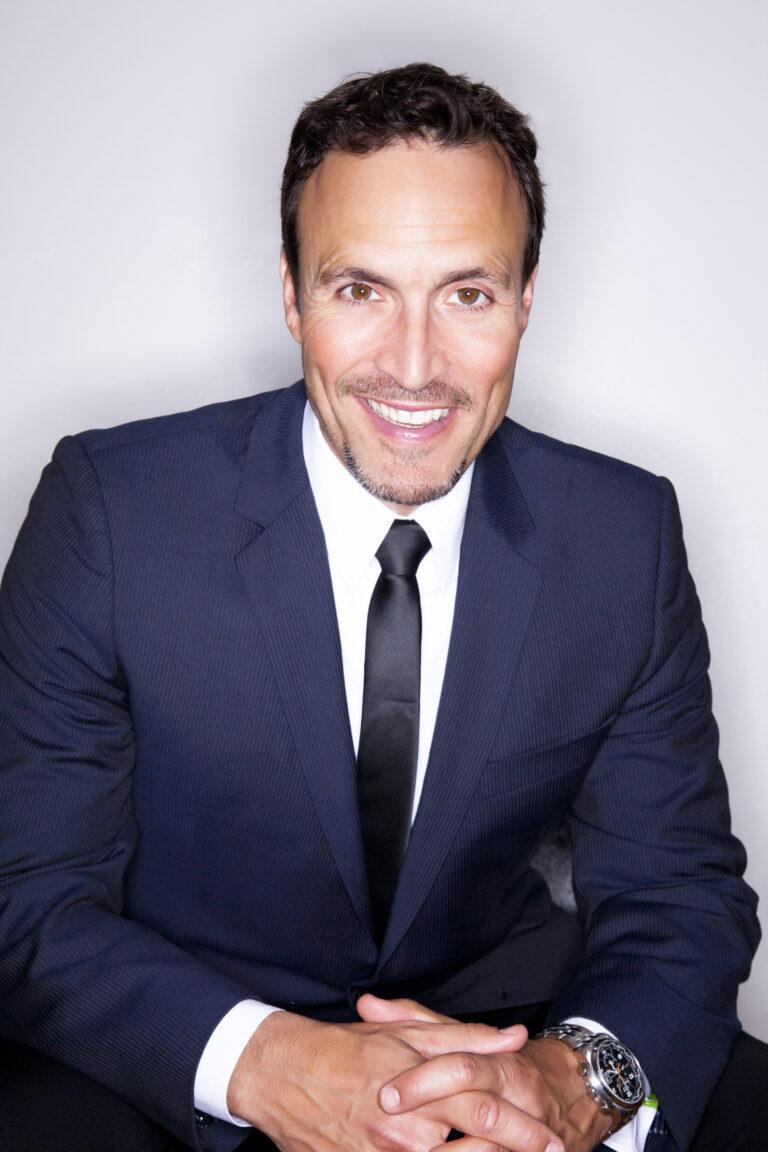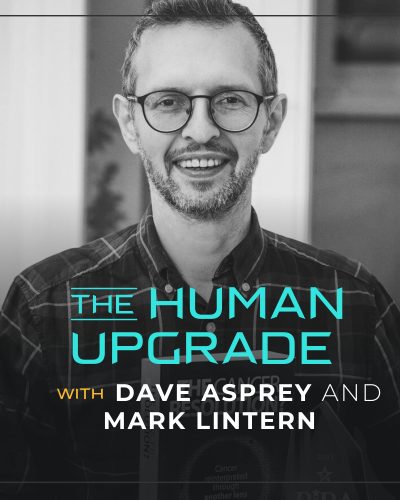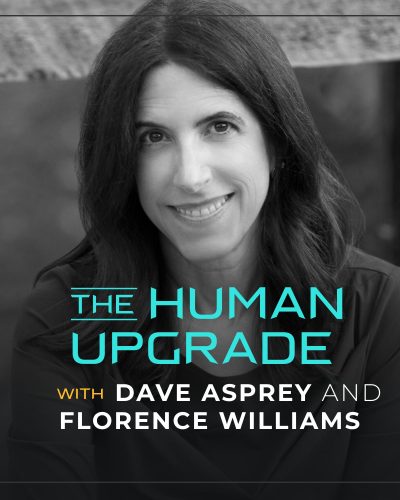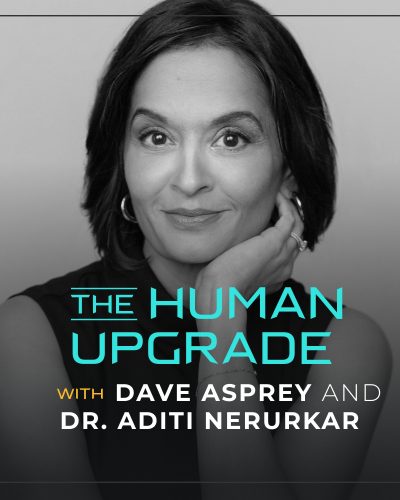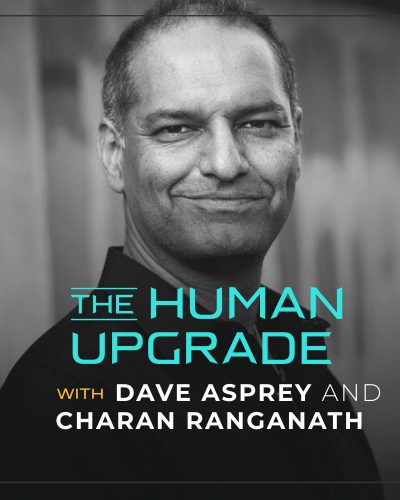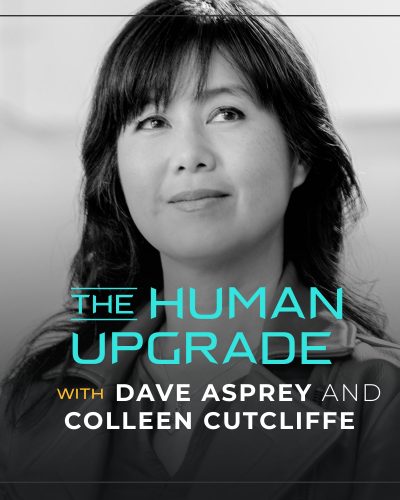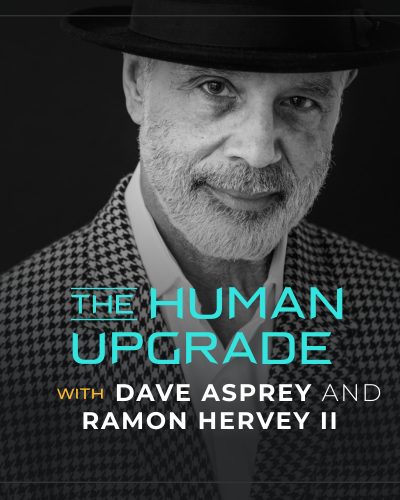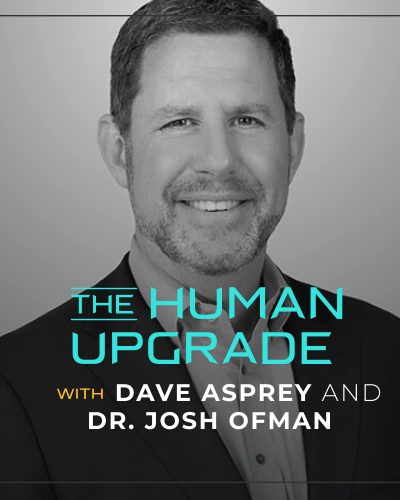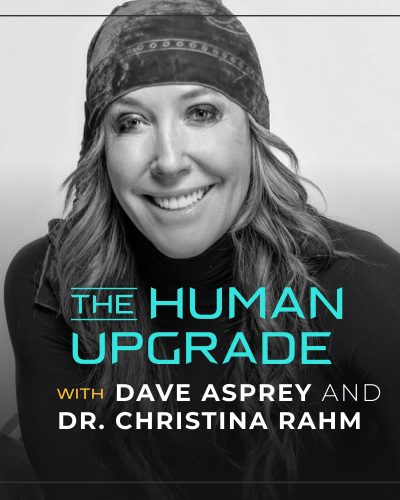EPISODE #1076
Upgrade Spotlight: Next generation nitric oxide support
Dr. Myles Spar
In today’s episode Dr. Spar is sharing the vast range of benefits of Calroy Health Sciences products I use in my morning routine, Arterosil and Vascanox. We talk about the science behind these products, and how they help support athletic performance and recovery, cardiovascular health and even sexual function.
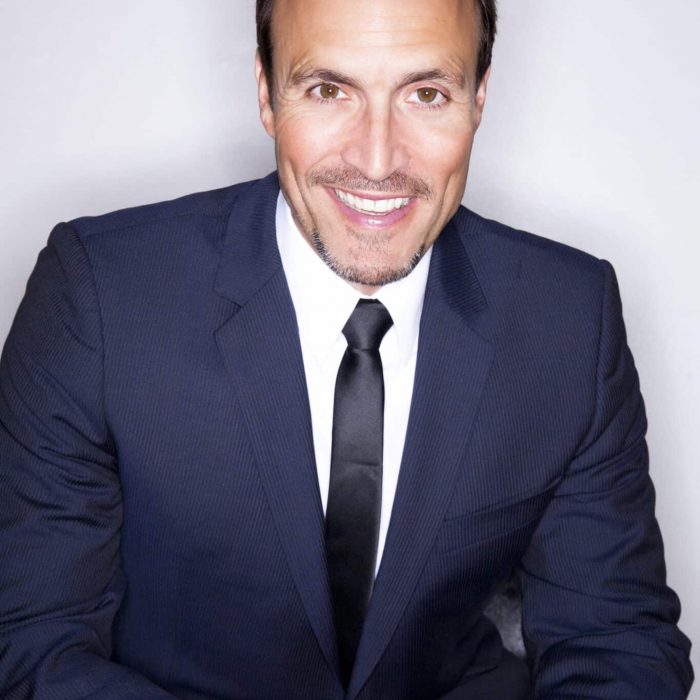
In this Episode of The Human Upgrade™...
Today’s episode is an Upgrade Spotlight edition, where we bring someone on the show who has created something interesting. Our guest today is Dr. Myles Spar, a leading authority in personalized performance medicine as an author, teacher, researcher, TEDx talk speaker, advisor to NBA players, and an Ironman athlete.
In today’s episode, Dr. Spar shares the vast range of benefits of Calroy Health Sciences products, many of which I use in my morning routine, including Arterosil and Vascanox. We talk about the science behind these formulations, and how they help support athletic performance, recovery, cardiovascular health, and even sexual function.
If you’re interested in trying these products yourself, you can get a discount off a three-month supply of Arterosil and Vascanox at calroy.com/dave.
“You are the CEO of your health.”
DR. MYLES SPAR
00:03:40 — Improve Cardiovascular Health with Vasconox
- The correlation between nitric oxide and endurance athletics
- Calroy Health Sciences: calroy.com
- Vascanox: calroy.com/product/vascanox-hp
- How nitric oxide supports vascular health
- How to collaborate with your doctor
00:13:02 — Spotlight on Nitric Oxide & Hydrogen Sulfide
- Nitric oxide and aging
- Three kinds of nitric oxide in the body
- How nitric oxide helps sexual function
- An explanation of hydrogen sulfide’s impact on the body
00:20:46 — Why Investing in Quality Supplements is Worthwhile
- Arterosil: calroy.com/product/arterosilhp
- Why I invest in 84+ supplements for my morning regimen
- The science behind Calroy products
- The importance of recovery and optimizing the speed of recovery
- Read: Smarter Not Harder
- My supplement fix for POTS, Postural Orthostatic Hypotension
Enjoy the show!
LISTEN: “Follow” or “subscribe” to The Human Upgrade™ with Dave Asprey on your favorite podcast platform.
REVIEW: Go to Apple Podcasts at daveasprey.com/apple and leave a (hopefully) 5-star rating and a creative review.
FEEDBACK: Got a comment, idea or question for the podcast? Submit via this form!
SOCIAL: Follow @thehumanupgradepodcast on Instagram and Facebook.
JOIN: Learn directly from Dave Asprey alongside others in a membership group: ourupgradecollective.com.
Sleep Solutions for High Performance:
https://sleepbreakthrough.com/dave use code DAVE10 to get an extra 10% off
Capture Life Force Energy:
https://leelaq.com, use discount code DAVE10 to get 10% off sitewide
Comfort Options for Hot & Cold Sleepers:
https://sleep.me/daveasprey, use code ASPREY for 25% off
Dave Asprey’s NEW Book ‘Smarter Not Harder’ is out now: https://daveasprey.com/books
Get a discount off a three-month supply of Arterosil and Vascanox at https://calroy.com/dave
Website: drspar.com
Facebook: Myles Spar, MD
Instagram: @drspar
Linkedin: @drspar
YouTube: @mdspar
[00:00:00] Dave: You’re listening to The Human Upgrade with Dave Asprey. Today’s episode is an Upgrade Spotlight edition, and that means that we bring someone in on the show who has created something interesting. I want you to hear from the creators here, from the founders, and the people who do the actual work so that you can judge for yourself what works, what doesn’t work. I bring on experts who maybe could save you some time, increase your energy, or improve your performance all in the areas of biohacking or personal development.
[00:00:34] And there’s too many knockoffs these days. People go out there, and they say, oh, I heard about something. I saw something new, so I will just make my own version of it that’s cheaper, and crappier, and doesn’t work. And I’ve seen this throughout the course of my time with Bulletproof and with some of my other companies, where the race to the bottom isn’t what you are here for.
[00:00:58] I want you to race to the finish line in a race you didn’t think you could even compete in and do it effortlessly while having a good time. And that’s going to take a little bit of work and some technology. And part of it is, find out who’s making what, and why, and how, and then work on that.
[00:01:17] Our guest today is Dr. Myles Spar, who’s an MD. He’s a leader in personalized performance medicine, and he’s an author, teacher, researcher, a TEDx speaker, and he advises NBA players. And because he’s a masochist, he’s also an Ironman athlete. Did I get all that right? Dr. Myles, Dr. Spar, what should I call you? Myles?
[00:01:40] Myles: You can call me Myles. Absolutely. Yeah, all that’s right. I wouldn’t call it masochism. I would call it, everybody has to have a goal where they push their edge, and for me, I just kept increasing the distances of triathlons. So I found one that would just almost kill me.
[00:01:57] Dave: So you only did it once, or do you do these all the time?
[00:01:59] Myles: Not all the time. I’ve done two full Ironman. I do a lot of the half Ironman races. Um, yeah, it’s hormesis. You got to push the edge.
[00:02:09] Dave: That’s a good excuse. There are other ways to feel pain, like just sitting in an ice bath or something.
[00:02:13] Myles: True. See that? I can’t deal with. There you go.
[00:02:16] Dave: I just did that this morning. That’s funny.
[00:02:18] Myles: And it’s great, and there are great benefits, and the science is there, and it’s so painful for me. So we each have our thing that we have to try and get done.
[00:02:28] Dave: There’s great evidence that doing something that doesn’t feel good every day, even just for a minute or two has a lot of good effects on dopamine signaling. I’ve been doing the cold plunge thing with my 13-year-old son.
[00:02:44] Myles: Nice.
[00:02:45] Dave: And we’ve been doing it every morning. And the idea is it makes everything else in the day suck less.
[00:02:52] Myles: That’s true.
[00:02:53] Dave: Right. And it’s the same with an Ironman. Although Ironman, your knees might regret it later, but when you’ve completed an Ironman, you’re like, man, nothing sucked as much as mile 99, or whatever the heck it was.
[00:03:03] Myles: Right, right.
[00:03:04] Dave: So full respect for doing it. I don’t know that I want to do that to my body, but also the discipline, it’s a real thing.
[00:03:13] Myles: Yeah. It’s a goal. It’s all about having a goal that you’re training towards. I need that thing to chase after and scratch off my list.
[00:03:22] Dave: All right. We’re going to talk about nitric oxide and Vascanox, which is a product that you make for 24-hour nitric oxide coverage. But since we’re talking about Ironman, is there a correlation between nitric oxide and endurance athletics?
[00:03:39] Myles: Absolutely. And it’s funny because even before I found out about Calroy and what they were doing with this product, I would take nitric oxide products, and I have my patients that I was helping to train for endurance races take nitric oxide products because we know they’re really important for vascular health.
[00:03:56] A lot of your listeners might take beet root related type products for that same purpose because nitric oxide is essential for vasodilation. It does a lot more as well. It’s actually a signaling molecule, almost like a neurotransmitter, what we call a gasotransmitter. But in terms of endurance training, it’s really important to provide blood flow.
[00:04:14] And obviously, you want blood flow both during the race to help promote your ability to increase your VO2 max and really get blood flowing to your lungs and in your heart, but also for recovery, really important, especially after a long race like an Ironman. But previously, all the nitric oxide products would work for a very short period of time.
[00:04:33] So I, literally, on a race, would have little ziplocks with tons of these little nitric oxide products in every hour. And imagine, on a 56-mile bike ride, there are a lot of hours in there because I’m not the fastest cyclist. So you’re constantly popping these little capsules, and your fingers are sticky from the goo, and you’re trying to grab a capsule as opposed to now having available Vascanox products that can last up to 24 hours. It’s a huge advantage.
[00:04:59] Dave: Okay, so it’s a longer-acting form. Let’s talk about what nitric oxide is. I know I’ve been talking about it, which is at least for eight or nine years on the show, as a signaling molecule, but for newer listeners, just walk through what is nitric oxide? What’s its role in the body?
[00:05:16] Myles: Sure. So it has a lot of roles. Like I said, it’s a neurotransmitter. But the main role we’re talking about here is vascular health. So even to take one step back, obviously vascular health is hugely important, not only because we think of cardiovascular disease as the number one killer, both men and women, but also just to deliver all these biohacking instruments, and substances, and anything you’re doing for biohacking to get where it will have its effect on your body.
[00:05:42] It needs to go through the bloodstream, and it goes through your bloodstream in your blood vessels. So nitric oxide is really important in helping those blood vessels stay healthy. One way is through making sure they’re dilated enough to deliver blood, but nitric oxide also helps protect the health of the blood vessels and helps the blood vessels produce other substances, which we can get into like superoxide dismutase.
[00:06:02] So it’s actually an important antioxidant because we know vascular health is dependent on not being damaged by oxidative damage. And it even also helps the brain, helps the immune system. So it has a lot of functions. But especially with regard to vascular health, it’s key to keeping the blood vessels healthy and keeping them open and dilated enough for blood to flow.
[00:06:26] Dave: The movies from the ’70s, if people have ever watched one of those, you see the guy’s like, oh, my heart. And then he has to take his little bottle of nitroglycerin tablets. And if it’s a really good movie, then they take all of them, and they make them blow up because nitroglycerin explodes. But this is something we’ve known for a while, that’s why nitroglycerin works. Right?
[00:06:49] Myles: Exactly. Yeah. It dilates that blood vessel. In those moments when someone’s having chest pain or angina, it’s because they’re not getting enough blood flow. But just like you do a stress test with the cardiologist to see when your heart is pumping hard, is it getting enough blood flow when it’s demand is higher because it’s working hard? So your body needs to be able to dilate those blood vessels to bring more blood flow to your heart when your heart’s working harder. The way it does that is by producing more nitric oxide.
[00:07:18] Dave: Okay. I get that. And does that mean that if people are having that lack of blood flow, the heart thing, that modern supplements will do the same thing that nitroglycerin was before?
[00:07:29] Myles: Not exactly. First of all, nitroglycerin’s going to work a little differently. And also, nitric oxide supplements aren’t going to be around as often, most of them, when you need it. That’s why this product, the Vascanox, helps keep it in your system longer, so it makes it less likely that you have a problem with blood flow because you’re keeping your blood vessels healthier and open more. Now, if you certainly are having chest pain or having an issue, you still need to do what your doctor says for you to do, and talk to them about having nitroglycerin available. So this is not a replacement for any–
[00:08:02] Dave: Wait. So there’s a conflict of interest here. I mean, you’re a doctor, and you’re saying, well, do what your doctor tells you to do. But I mean, a lot of doctors are telling us to take statins and do all sorts of weird procedures that maybe aren’t medically necessary at this point. So shouldn’t you work with your doctor and consider what your doctor tells you to do, and then get a second opinion if it sounds like it’s crazy?
[00:08:24] Myles: Absolutely. Absolutely. My point was don’t take this instead of some prescription. Yeah, I don’t want to get in trouble with the FDA or anybody else. Throw away your prescriptions and take this instead. Yeah.
[00:08:35] Dave: Exactly. I understand. And it’s funny. I actually went to ChatGPT-4, and it’s read all of my books and all thousands of my blog posts and listened to all my podcasts and all. And I said, so what would Dave Asprey say about this?
[00:08:51] Myles: You asked it that?
[00:08:52] Dave: And it says, before you do any health thing, talk to your doctor first, and then some stuff, which was 70% accurate, and some stuff I would never recommend. And then at the end, it says, make sure you talk to your doctor. And I’m like, I’m pretty sure I didn’t say that. Because I do think you should talk to a doctor as a part of your healing team, but you lead the team, and your doctor helps support you. [Inaudible] patients do that?
[00:09:16] Myles: No, I want patients to do that, and I tell patients to do that. If your doctor isn’t comfortable with you being the CEO, and they’re just one of your advisors, then get a new doctor. Absolutely. Now, you are the CEO of your health. I mean, that sounds so cliche, but it’s really true. And you should have your doctor. The other thing that pisses me off is when the doctor doesn’t talk to your other care practitioners. They should be all talking together, working toward whatever your goal is, not making you translate among them.
[00:09:44] Dave: Exactly. And by the way, this applies to chronic disease management performance medicine. If you’re in an ambulance, you probably should do what they say, right?
[00:09:54] Myles: Exactly. Don’t say, no, I’m taking my supplement. Don’t give me the nitroglycerin. Take the fricking nitroglycerin. If you’re having chest pain, it could be a spray under the tongue. It could be a pill under the tongue. Do what they say.
[00:10:06] Dave: Yeah, that’s a fair point. I am guilty of not doing that. We have time for a little story. Years ago, as I was starting to understand biohacking, and I was doing anti-aging stuff, I was still working in tech, and I flew to China, and I gave a speech, and I was there for 16 hours. And then I flew to Florida, and then I was there for 18 hours.
[00:10:31] And then I woke up for a 6:00 AM flight out of Florida. And so I was severely sleep deprived and probably dehydrated. And there was a long line, so I didn’t get to make or even to buy coffee. And I didn’t get to buy a bottle of water before I got on the airplane. I got on the airplane, and I was like, okay. The flight took off, and we were flying, and I went to go to the bathroom.
[00:10:56] And I woke up in this most glorious rested state, and there’s someone shaking me awake. I passed out on the floor by the bathroom. I don’t have any recollection of it. And it’s one of those, is there a doctor on the plane sort of things. Uh, and I came to, and they’re like, here, have some orange juice. So I’m like, I’m keto. I’m not having your fucking orange juice.
[00:11:21] In reality, though, it wasn’t low blood sugar. I had low blood pressure for a while. I was so dehydrated, and my adrenals were so tweaked just from all this time zone and just lack of sleep that I couldn’t make enough cortisol in order to keep my blood pressure high when I didn’t have enough water in my blood. And so low blood pressure feels terrible. Uh, and that’s what that was. But had I taken nitric oxide, nitric oxide lowers blood pressure even more, right?
[00:11:49] Myles: Right. So that would not have been the solution. Right.
[00:11:52] Dave: That’s why you do what the EMT says, but orange juice wasn’t the solution, and I knew it even though I was groggy. I was like, give me water. Give me salt. That’s what I needed.
[00:12:01] Myles: It’s true. Yeah. That’s what we’re trained, is try the OJ. If they’re having chest pain, try the nitro. But yeah, we should start to think about the salt more often for sure. Yeah.
[00:12:10] Dave: Yeah, salt is good, but it takes a while to take action.
[00:12:13] Myles: Yeah.
[00:12:15] Dave: And for the record, I was fine, and no one had to give me mouth to mouth or anything like that Um, and when we landed, I was completely normal, and they wanted to take me off in a stretcher. I’m like, I can walk, guys. It’s okay. But that was odd. I’m just glad I didn’t have an Arianna Huffington moment where she had something similar happen but fell down, and hit her head, and injured herself.
[00:12:35] Myles: Oh God. Yeah.
[00:12:35] Dave: Um, we talked about that from sleep deprivation. So guys, you should get some sleep. And if you don’t sleep, maybe you should take some hydrocortisone, and that’ll help.
[00:12:42] Myles: And hydrate with electrolytes. Yeah.
[00:12:44] Dave: Exactly. Let’s talk about nitric oxide and aging because you’re interested in anti-aging. I’ve written a major book. I’m planning to live to at least 180 years old, and it turns out nitric oxide affects several of the mechanisms of aging that are in the book. So talk to me about the big three anti-aging things nitric oxide does for you.
[00:13:04] Myles: Big three. I’m not sure what you had in mind specifically, but I could–
[00:13:09] Dave: I’ll tell you, from my research, we’ve got telomere shortening, mitochondrial function, and stem cell function.
[00:13:16] Myles: So beyond vascular health, yeah, nitric oxide has a big role to play in longevity. It affects telomeres. It affects mitochondrial function. The other thing that I’m really interested in about nitric oxide is there are many ways to produce it. What we’re talking about mostly around vascular health is endothelial nitric oxide synthase, but there’s another form of nitric oxide that gets produced when you have infections and inflammation.
[00:13:41] And we know a lot of aging relates to inflammation. One way nitric oxide plays into that is the more inflammation you have, the more your body is skewing toward this form of inflammation oriented nitric oxide synthase, and then there’s less nitric oxide synthase available from the endothelial produced kind.
[00:14:02] And you have less nitric oxide available for vascular health. So that may even be one way that inflammation affects vascular health, because you have less active nitric oxide to affect endothelial function when you have a lot of inflammation in the body. It’s all being skewed toward this other NOS, nitric oxide synthase form.
[00:14:20] Dave: Well, so there’s three kinds of nitric oxide in the body, right? There’s endothelial, which is the good guy. There’s inducible, or iNOS, which is the bad guy for inflammation, and then there’s nNOS, which is the neurological NOS, which I think is a good guy. That’s one you want, right?
[00:14:39] Myles: Absolutely. Yes. It’s good for brain function. For sure.
[00:14:42] Dave: And if we’re walking around in an inflamed state, like I have been in for much of my life before I got all this stuff under control, then you end up with the inducible NOS. And some of this is genetic. You might have NOS1, NOS2, NOS3 genes that give you a more likelihood of having inflammation from nitric oxide versus having healthy blood vessels from nitric oxide. Am I interpreting that all right?
[00:15:08] Myles: That’s correct. Yeah. Exactly. It’s always good to do genetic testing to see where you’re at and what you need to work on the most, but yeah, that’s certainly one of them, but you can have overactive inducible nitric oxide to your point, synthase, and therefore less nitric oxide synthase happening in the endothelium where you really want it to keep that not only vascular health healthy, but the amount of superoxide dismutase being produced to keep antioxidative work happening to decrease aging and decrease the impact of aging.
[00:15:39] Dave: So SOD, which is the mitochondrial antioxidant that your body manufactures in response to inducible NOS, would be a counterbalance to that. And it also, I think, makes SOD to protect you from excessive amounts of iNOS even if that happened, right?
[00:15:59] Myles: Right. Exactly.
[00:16:02] Dave: Okay. So then what it sounds like is you want to have healthy nitric oxide production of the right type, and then you want to have healthy antioxidant production so that should there be too much nitric oxide to the point it becomes peroxynitrite, that you immediately quench that free radical, and then you end up having a very healthy body. So it’s a cool system that we’re hacking right there, right?
[00:16:29] Myles: It is. And the other part of this that’s interesting about this product, Vascanox, is it takes advantage of a synergistic molecule called hydrogen sulfide, which actually has a lot of role to play with nitric oxide because nitric oxide itself is very, very short-acting. It just stays in the body for seconds.
[00:16:48] So that’s why it’s hard to keep the level of healthy nitric oxide up for a long period of time unless you work to keep it around longer. And the way nitric oxide is stored is in something called nitrosothiols. So hydrogen sulfide helps nitric oxide get released from those nitrosothiols and helps have more steady production of healthy nitric oxide. The other really interesting thing about hydrogen sulfide is regarding vascular health.
[00:17:14] So nitric oxide, we also think of as helping with blood vessel dilation in sexual and erectile tissue and helping sexual function. That’s because nitric oxide helps produce cyclic GMP, which I think you’ve talked about on this show before. But that gets degraded by PDE5. That’s why we think of the PDE5 inhibitors like Viagra and Cialis.
[00:17:34] Well, hydrogen sulfide acts like a PDE5 inhibitor, so, uh, it helps release nitric oxide from nitrosothiols, so that helps with dilation, but then that nitric oxide is helping produce cyclic GMP, which would get degraded but for hydrogen sulfide coming in and acting almost like a Viagra, acting as an inhibitor of that PDE5 enzyme. So it helps more nitric oxide get released, and it helps the effect last longer of that nitric oxide on the vasodilation.
[00:18:00] Dave: That is fascinating. And you’ve explained a mystery to me that I haven’t thought about in a while. So hydrogen sulfide is a really nasty rotten egg smelling gas, and it’s highly poisonous. It acts like cyanide in the body. It inhibits mitochondrial respiration, so your body stops making energy at higher doses, right?
[00:18:21] Myles: And depends on where it is. Right. And in the gut, people think of SIBO. Not good. You don’t want a lot of hydrogen sulfide in your upper intestines. You’ll feel like crap, and you’ll have–
[00:18:29] Dave: And plus, all your friends won’t want to sit in a car with you, right?
[00:18:31] Myles: Exactly.
[00:18:32] Dave: That’s pretty potent rotten egg stuff.
[00:18:34] Myles: Right. But it has a lot of really important functions in the body also.
[00:18:39] Dave: No kidding. So now we’ve got this interesting conversation where with Vascanox, you’re providing something for nitric oxide. We’ll talk about what that ingredient is. But you’re also providing something for hydrogen sulfide in a good way that isn’t going to give me rotten egg farts.
[00:19:59] Myles: Hopefully not. Right. You’re taking another form. And your body, like I said, it’s not just the rotten egg parts from H2S, hydrogen sulfide. It actually is an anti-inflammatory. It’s also what we call a gasotransmitter, like nitric oxide, like a neurotransmitter. It has effects in the brain, has effects all over the body.
[00:20:15] It actually increases Nrf2, which is a really important anti-inflammatory molecule. There’s even thought to be some of the mechanisms of caloric restriction can come through increasing endogenous production of hydrogen sulfide. So yeah, part of the story is understanding that like most things, it’s not all bad.
[00:20:32] Most things in the body, you talk about mTOR, it’s not all bad, not all good. You don’t always want high mTOR. You want it going up and down. Same thing with things like hydrogen sulfide. Most things in the body, you want the right amount, not too much. And you want it in the right place.
[00:20:45] Dave: If I take Vascanox every day, is that the right amount of hydrogen sulfide and nitric oxide?
[00:20:55] Myles: Yeah. Because you’re not taking hydrogen sulfide or nitric oxide. You’re actually taking natural products that work with the body’s own production. So it’s like taking something that helps release the right amount versus taking the thing itself that is exogenously just overtaking the body’s own natural mechanisms to control its production. So you’re basically signaling. It’s a signaling molecule that you’re giving the body to create the right milieu to produce the optimal amount of both nitric oxide and hydrogen sulfide.
[00:21:27] Dave: And I should have mentioned this at the start of the show, but a lot of listeners know about Arterosil, which is a really well clinically studied compound. I’ve been taking it for, I think, seven years now. That protects the, it’s called the glycocalyx, the lining of the arteries. It’s the supplement with the most studies for that. And that’s an area where I have probably a higher level of risk than some people, just given my history and genetics.
[00:21:54] So I know that Arterosil works because there’s just tons of studies on it. And about six months ago, you guys released this new product. And the idea here is they’re both vascular-oriented protectors.
[00:22:08] Myles: Exactly. Yeah, the Arterosil is really important in that endothelial glycocalyx and keeping that healthy. It’s relatively newly discovered. That’s such an important part of our blood vessels. But blood vessels, as I know your listeners know, aren’t just a bunch of hollow tubes. They’re actually very active in being semi-permeable membranes, deciding what goes in, what stays out, and in affecting things like SOD production and affecting your immune system function.
[00:22:37] And so keeping that lining healthy is essential. So Arterosil comes from a rare seaweed called Monostroma Nitidum, and it’s a substance in there called Rhamnan sulfate that actually helps keep up the resilience of this hairy-like lining called endothelial glycocalyx of all of your blood vessels.
[00:22:57] Dave: So if either you’re at high risk, which I am, or if you’re on an aggressive anti-aging regimen, which I also am, then you would consider taking Arterosil and Vascanox together. And sometimes people say, well, Dave, how many supplements do you take? I just posted a picture, a couple of days ago, and I counted, I don’t know my count, and I had 84 capsules in my morning. And yes, your products were in that stack of things.
[00:23:29] Myles: Nice.
[00:23:30] Dave: And some people were like, you should get your supplements from food or whatever. I’m like, yeah, you should get all of your toxins from Mother Nature too, and you should be outdoors in sunlight, barefoot, wandering on the beach all day long. So maybe that lined up, except even then, people weren’t longer-lived than Mother Nature wanted. So I don’t think that argument holds weight.
[00:23:53] And then some people say, it’s expensive. And it’s actually much less expensive than going to the hospital one time by ambulance. Literally, that can cost you $80,000. And so I look at my supplement bill as part of my health insurance. And that’s just how I see it. And I still need health insurance if I get in a car accident or something, but if I do end up having some chronic thing, which probably will happen at some point in the next 100 plus years, I’m still going to be 10 times more resilient, and I’ll drive myself to the hospital. Thank you very much.
[00:24:32] So if you’re playing the odds, I think it’s worth investing in the areas where you either have the biggest goals and get the most benefits, or were you have the highest risk. And I do know that I have the same genes that you’ll find actually most commonly in Western Africa that mean that if you’re like trying to figure out what’s the most likely disease that’s going to take you out based on your genetics, totally ignoring RNA, and your lifestyle, and all that stuff, well, for me, it’s probably cardiovascular.
[00:25:01] So I watch those variables more, and I overemphasize my supplements there, which is why Arterosil has been in my stack since I found out about it at the American Academy of Anti-Aging Medicine many years ago. And you guys just came out with Vascanox. I’m like, I think that’s a good one for me.
[00:25:17] But if you’re listening to the show, you may say, cardiovascular is not something you’re worried about yet because we have more listeners 25 to 35 than anywhere else, and you’re like, I’m building my career. I don’t want to do this. You actually might want to try one of these, but maybe it’s Vascanox because, well, that thing we talked about with PDE that’s Viagra, and you might find that your dating life improves.
[00:25:43] Myles: Exactly. I would also say, if you’re taking a bunch of other supplements, the only way, like I was saying before, that they will get to where they need to work is through your vascular system.
[00:25:54] Dave: Fair point.
[00:25:56] Myles: To me, the basis should be, let’s keep that highway running smooth and as wide open as possible to get everything else you’re taking delivered to where they need to do their job.
[00:26:08] Dave: All right. How much research have you studied, or have you published? This is a new product. Um, it’s only been on the market for six or seven months, and I really trust Arteosil because, I don’t know, is it a dozen plus studies? It’s very well-studied. So Vascanox, what research did you do so that you know it works?
[00:26:31] Myles: Well, I’d recommend listeners go to the Calroy Health Sciences website to see. There are definitely some studies published. There will be many more coming. There have been some exciting pilot studies looking actually at it efficacy in athletes, for example, even beyond just the scientific studies that you would see on that website.
[00:26:49] So there’ll be more to come on that. There were some small pre-pilot studies looking at impact on VO2 max and impact on power over heart rate, which is your functional threshold power. So some really exciting studies to come, but in terms of the hardcore science of how the ingredients of Vascanox work to improve nitric oxide and that whole hydrogen sulfide story, there’s a lot of science behind the basis on how Vascanox does its job of increasing nitric oxide up to 24 hours.
[00:27:22] Dave: I like it. There’s a bunch of resources there for you. And if you’re listening and going, I don’t want to read all the resources, you could just try it and see if you wake up with a kickstand, or your athletic performance works better, things like that. Because I’ve been hearing from more and more men in their 20s and 30s, who I think probably because of endocrine-disrupting and testosterone declines are actually experiencing ED.
[00:27:49] I just did an episode that’s about to come out where I talk about that, and they’re reaching out, sometimes on DMs, just saying like, what do I do about this? This is crazy. That’s not supposed to happen until you’re 60. And I think nitric oxide’s a major part of that.
[00:28:04] Myles: Absolutely. And also, like I said, athletic performance, I noticed the difference. I know my patients do, just in terms of going a little bit faster, having heart rate not go quite up as high to achieve the same power. That’s actually a very noticeable difference. And recovery. Recovery is huge. We’ve only, I think in the last 10 years, started realizing, oh, you can’t just work out hard every day.
[00:28:25] You actually aren’t going to make the gains, and you’re going to hurt yourself. So that recovery is essential to actually achieve the gains you’re working toward. And for the recovery to really be optimized, you need the blood flow. And so nitric oxide, you will notice a difference in that as well.
[00:28:41] Dave: If you’ve had a chance to read Smarter Not Harder, which is my last book on biohacking, I talk about a bunch of ways to get more exercise in less time, how to increase the load more quickly so that you can increase the speed of recovery more quickly. Because the speed of recovery is actually one of the things that drives how much you get gains of muscle or endurance. It’s not how much work you did. It was how fast you did some work, and then how fast you stopped doing it. Uh, so it’s slope of the curve instead of area under the curve, if you’re a math nerd and can draw that graph in your head.
[00:29:17] Myles: Exactly. And even doing high intensity interval training, it depends on that, on ability to get your heart rate to recover quickly. And some of these pre-pilot studies have shown Vascanox can actually help with that, again, because you’re having more blood flow. So your heart doesn’t have to pump as hard to get as much blood circulated. It actually showed a faster decline in heart rate after a high intensity exercise.
[00:29:37] Dave: Wow. According to my theories, the faster the decline in heart rate after exercise, the more adaptation your body will do as long as you have enough minerals, drink your Danger Coffee, and as long as you have enough animal protein, put down the gluten-based plant protein, and walk away. You do those kinds of things.
[00:29:57] But I still have a couple more questions for you because on the weight training side of Smarter Not Harder, I talked about a set of technologies that let you put more load, or different load on the muscles than they’re used to. So you can grow muscle three to five times faster than you would just from flopping weights around the way a lot of people do.
[00:30:18] So I talked about the stuff we do at Upgrade Labs, which is an AI-driven loading of the muscles. So they just get loaded very quickly. I could see this working. But I also talked about blood flow restriction. I talked about electrical stimulation, and a few other things like that. So do you have any observations about using Vascanox with things that change blood flow like these bands? I did a podcast a while ago about blood flow restriction.
[00:30:46] Myles: That’s a great question. I have not seen any studies that we’ve done yet on that, but that’s certainly something to look into. I love that idea.
[00:30:54] Dave: Okay. I’m getting a question from the Upgrade Collective here. If you have low blood pressure, should you take Vascanox?
[00:31:03] Myles: So I would definitely check your blood pressure before and after and monitor it. Certainly, it’s not a replacement. I have to say that caveat that ChatGPT said for you. It’s not a replacement for blood pressure medicine. It is not a treatment.
[00:31:16] Dave: Low blood pressure and highblood pressure.
[00:31:17] Myles: Right. Yeah, I know, but I just wanted to make sure. That’s fair. So yeah, certainly, if you have low blood pressure and it’s asymptomatic because you’re an athlete and you’re healthy, it should be fine. I would take it, and test it out, and see. If you have low blood pressure, you’re symptomatic, like you have POTS or something like that, then I would be cautious with taking it, for sure.
[00:31:34] Dave: So I’m going to throw some experience in there. I talked about POTS when Nick Foles was on the show, the Super Bowl champion, who’s a friend, and his wife had a meaningful case of POTS. And I’ve had POTS for actually my entire life, as far as I can tell. So this POTS is Postural Orthostatic Hypotension.
[00:31:57] What it basically means is that you have low blood pressure, and it means that when you stand up suddenly, you see stars. And I just thought everyone did that when I was a kid. And that’s why I passed out on that airplane. So would you want to suppress your nitric oxide to unnaturally increase your blood pressure to get it up to normal levels so your brain has enough blood in it?
[00:32:15] No, because then you’ll die sooner. So my take on that is, if you have low blood pressure, in other words, you get dizzy when you stand up, especially if you’re really tired, what you would do is you would drink lots of water with electrolytes that contain sodium. When I raised my sodium levels up to eight grams a day, which is not a problem as long as you have enough potassium, it helped a lot.
[00:32:40] And if you need it, you take cortisol, bio-identical cortisol. Same way you take thyroid hormone, you can take cortisol as a hormone only if your labs say you need it, or only if you’re really tired because you flew to China and didn’t get enough sleep. So you can use it as needed. So if you have low blood pressure, I think there’s a clear argument for keeping your arteries in your body healthy by supporting nitric oxide production because you need it. And doing whatever else it takes to raise your blood pressure enough.
[00:33:11] So I take Vascanox. I take nitric oxide short-acting supplements also, especially on dates. I wonder why. And I also manage my blood pressure because I understand sodium and cortisol, oh, and licorice root for people who are interested, are ways to keep your blood pressure up if you need to do it.
[00:33:33] Now, if people are taking blood pressure meds to lower their blood pressure, and they start taking Vascanox, which could lower the blood pressure some more, then you should have a meter, and you should see because you might need to talk to your doctor about adjusting your dosage of blood pressure-lowering medication down. All that sounds good to you?
[00:33:54] Myles: That sounds good. Yeah. And again, remember that this isn’t nitroglycerin, so you’re not exogenously taking a bunch of direct vasodilating nitroglycerin that is going to bypass the body’s production. Here, with Vascanox, you’re supporting the body’s production of nitric oxide. So it’s low risk because if you have low blood pressure, and you don’t need more nitric oxide, then your body isn’t going to produce a lot more nitric oxide. But if the body can benefit from more nitric oxide, which the vast majority of us can, then the Vascanox will help the body produce more.
[00:34:29] Dave: If your gut is screwed up and you take Vascanox, is there a chance of your body making more peroxynitrite and giving you headaches and things like that?
[00:34:39] Myles: Oh, good question. No, that hasn’t been shown. It’s actually shown very, very minimal side effects, but it should not cause problems like that. No.
[00:34:46] Dave: About 10 years ago, when I was really dealing with a lot of neurological inflammation, I’m still dealing with some toxic mold stuff, I did experiment, I don’t even remember what it was back in the day. I did experiment with some ways to raise nitric oxide, and everything I could do would just give me the worst headache ever. And I concluded it was because it went to peroxynitrite, but those are really older technologies. I don’t remember what it was. But I have had none of that from Vascanox or any of the other ways that you would normally try to raise this.
[00:35:25] Myles: Yeah. Again, I think it’s more signaling. I mean, even with blood pressure, I wanted to add, and you could even edit this to add it back to the blood pressure discussion, there was a study looking at Vascanox with patients with high blood pressure and those with normal blood pressure, and it did not lower blood pressure to a hypotensive level in those with normal blood pressure.
[00:35:46] Dave: That’s helpful.
[00:35:47] Myles: So it’s the same idea as the peroxynitrite thing. It’s not going to take over the body’s own regulatory mechanism.
[00:35:56] Dave: So you’ll still manage it. All right. How does Vascanox create that 24-hour benefit versus the things that we know about that will last for four, or six hours, or something? What gives it the long range?
[00:36:12] Myles: That’s the hydrogen sulfide. Because it supports hydrogen sulfide. So that’s literally the magic of the hydrogen sulfide, because that was the discovery that’s really important in this product. It helps increase hydrogen sulfide, again, naturally. Again, not just bombarding the body with hydrosulfide, but by having supplements that increase hydrosulfide production. And then that’s what increases the release of nitric oxide from the nitrosothiols and increases the direction of action of the nitric oxide.
[00:36:39] Dave: Beautiful. And is this a morning supplement or a nighttime supplement?
[00:36:45] Myles: Generally morning. Take two in the morning once a day, and you’re good to go.
[00:36:50] Dave: Good deal. I appreciate you coming on and talking about this. And for listeners, guys, we got a little bit technical in all this, but you need to be technical enough, like, does this apply to you? Is this where you want to put your number of capsules you’re willing to swallow and number of dollars you’re willing to spend? And decide whether it’s worth it.
[00:37:10] The longer I’ve been a biohacker, the more I go foundational. That’s why I’m such a fan of boring things like minerals. That’s why they’re in the coffee, boring things like vitamin D, and vitamin A, and things like that. They’re not the sexy supplements, but they’re foundational to everything.
[00:37:27] The other thing that’s foundational is nitric oxide, because nothing gets there without transport. And because cardiovascular risk is one of the highest risks when you look at what’s likely to keep you from living to 180, so you’re thinking, okay, this is something that’s going to have broad effects across the body, not just exercise, but across everything.
[00:37:48] And we know that it helps with telomeres. At least nitric oxide helps with telomeres, helps with mitochondrial function, and it helps with stem cell release even. So this is one of those things you get many different benefits from the same thing. So this is one that’s definitely worth considering, which, frankly, it’s why you’re on the show.
[00:38:09] Myles, speaking of saving money on supplements, you guys were kind enough to offer 20% off a three-month supply of Arterosil and Vascanox. Just go to Calroy, C-A-L-R-O-Y.com/dave. That’s a meaningful savings. Take it and see if you notice a difference in your brain or maybe in the bedroom, because those are the areas you’re probably going to feel it first. And if you are a masochist like Myles, and you’re going to go run an Ironman again, you’ll probably see a difference there too.
[00:38:41] Myles: Absolutely. Got to do it.
[00:38:45] Dave: All right, guys. Thank you for listening to the show today. I appreciate your support. And as you’ve learned, anytime I bring an expert on to talk about a product like this, you always get a discount. And I screen these very, very heavily so you learn something new and something that isn’t just a me too a product. This is new stuff. I have never seen someone use hydrogen sulfide like this. So worth your time, worth your attention, and probably worth swallowing another couple of capsules in the morning because I’d love to race with you to see if you can live to 180.
